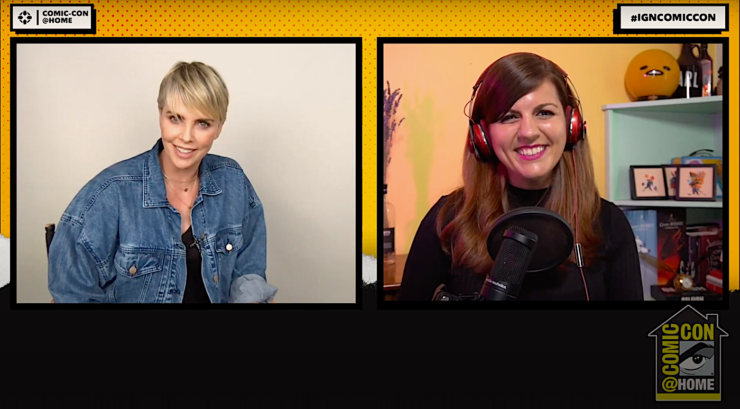In the wake of Netflix’s The Old Guard, San Diego Comic-Con rightly decided to celebrate Charlize Theron’s career in bad-assery. Theron joined IGN’s Terri Schwartz for a fun Q&A on the importance of Ripley, using fear as a motivator, and out-driving Mark Wahlberg.
Watch the whole conversation here, or skip down for highlights!
On action origins:
I was raised by a mother who loved Chuck Norris and Charles Bronson movies, and my dad loved Mad Max. I was raised on action films, peppered with things like Sophie’s Choice and Kramer vs Kramer at super inappropriate ages like 8, 9, 10….it summed up where my career went.
On Aeon Flux:
It was really hard making Aeon Flux. There were all these preconceived ideas, and boxes people wanted to squeeze you into…it’s a character that I think would be celebrated way more today than in 2004.
On stunt driving:
[While filming The Italian Job] I was the only woman with a bunch of guys. And we got the schedules, and I had been scheduled for six weeks more car training that any of the guys. It was so insulting. But it also put a fire under my ass…I made it a point to outdrive all of those guys. I vividly remember Mark Wahlberg halfway through one of our training sessions pulling over and throwing up because you get so nauseous from doing 360s. But I was very proud of the stunt work we did in that. I do a stunt in that movie where I do a reverse 360 in a warehouse with props everywhere—and people—and I did that stunt completely on my own.
On women in action films:
It felt to me like we were pushing the envelope and we were saying this concept that somehow women in the industry have been arguing to fight like men, it’s just so ridiculous. When we celebrate women fighting like women, we’re smart about what body parts we would be using, that we can’t punch as much because we will break every bone in our hand—but we can fight just as well without our elbows, with our heads, with our knees. That was when it became really exciting to me.
On representation:
When we talk about representation, not just racial representation and cultural representation, but female representation, I remember vividly just feeling such a lack of watching conflicted women. There was a part of me that felt unbelievably jealous of people like Jack Nicholson and Robert De Niro who got to play all of these really fucked up people, and women very rarely got to explore that. There was this fear of putting a woman in circumstances where she might not shine. Society still has us in that madonna/whore box…and it’s a disservice to women in general. We are more complicated than those two things.
On different kinds of heroism:
I have a knee-jerk reaction whenever anyone pitches me a story with a first line like, “She is a warrior and she is a hero.” It oversimplifies the complexities and the beauty of what it means to be a woman. And I’ve never strived to underline those characteristics in any of the characters I’ve played. All of my character have this sense of…they’re all survivors. They’re all just trying to survive. And that I can relate to. I am not a hero, I don’t relate to heroes, I think the people who inspire me are the people who don’t think of themselves as heroes—they put their head down, they do the work.
On the importance of Ripley:
The first time I saw Sigourney Weaver play Ripley, it just changed everything for me. It wasn’t forced, it wasn’t written, and it was acted, it was just lived. She was just living in that world in such an authentic way. And Furiosa was the first time that—I couldn’t even look at her as a character. She felt so real to me. And maybe it was because the shoot was so hard, and we were there for so long, we really did live in that environment for so long…if that character can do in a small part what Ripley did for me as an actor and a woman? That’s something I’m incredibly proud of. That doesn’t happen in everybody’s career. I feel really lucky that I was given that opportunity, that I was prepared for that opportunity, and that I was able to lay it out there and give it my all.
On Atomic Blonde:
My entry into action came much later in my life. I made Atomic blonde when I was 40 years old. There’s a sense of like, “Time is running out…if this means this much to you, and you want to stay in this game, you gotta get it right.” So, there was a lot of pressure. I put a lot of pressure on everybody on that movie, I hired [director] David Leitch for that reason, because I knew he could handle it. I said to him, “I’m never going to stop, and I’m going to expect you to never stop.”
On the importance of fear:
Everything I create comes from a place of fear. I don’t know how to create not from a place of fear. Not that I’m saying that you can’t—I just haven’t. I think the idea of going into a project and not being scared would actually freak me out? It would feel really wrong. I think my creativity really just thrives around my fear…I was raised very much in the sense of “You get up, you do it, you don’t wallow in it, and you don’t show [fear]”—but it doesn’t mean that I don’t feel it. I feel it on an every day, every second basis. But that is the thing that makes me not stop.











Charlize is a national treasure.